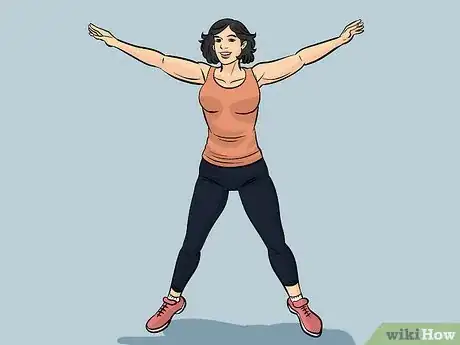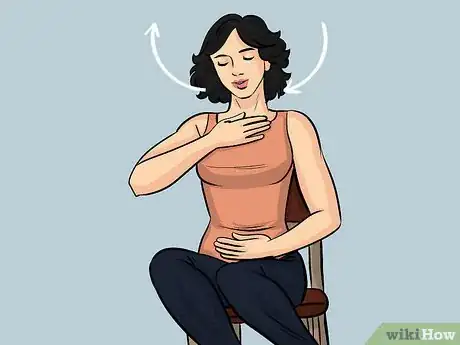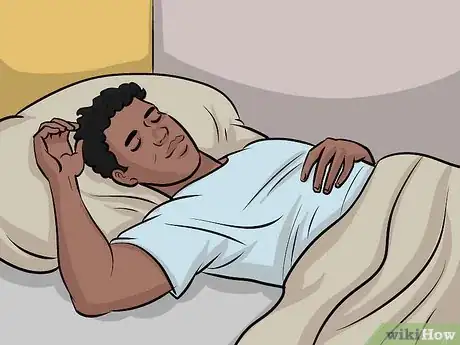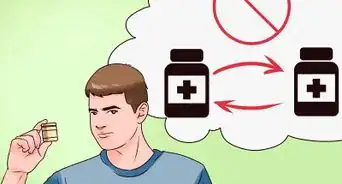This article was co-authored by Marc Kayem, MD. Dr. Marc Kayem is a board certified Otolaryngologist and Facial Plastic Surgeon based in Beverly Hills, California. He practices and specializes in cosmetic services and sleep-related disorders. He received his Doctorate in Medicine from the University of Ottawa, is board certified by the American Board of Otolaryngology, and is a Fellow of the Royal College of Surgeons of Canada.
There are 12 references cited in this article, which can be found at the bottom of the page.
wikiHow marks an article as reader-approved once it receives enough positive feedback. This article received 11 testimonials and 87% of readers who voted found it helpful, earning it our reader-approved status.
This article has been viewed 289,220 times.
It is very important to get enough sleep. In the short-term, not getting enough sleep can cause many problems, like decreased mental functions and mood swings.[1] Sometimes, however, it's necessary to pull an all-nighter to finish work that needs to get done. It is difficult but not impossible. You can improve your chances of success by planning ahead of time, keeping yourself energized, and staying alert. Afterwards, you’ll want to make sure you catch up on lost sleep.
Steps
Setting the Right Environment
-
1Don’t get too comfortable. If you are staying awake longer than normal, you’ll have to resist the temptation to sleep. Stay out of bed, don’t wear pajamas, and avoid anything else that is part of your sleep routine.[2] Keep the temperature warm enough or cool enough that you are slightly uncomfortable, and more likely to stay awake.
-
2Keep your environment well-lit. Your body’s basic sleep cycle is tied to light during the day and dark at night. This means that dim lights can make you sleepy, especially if you are staying up beyond your usual bed time. Bright lights, however, can increase alertness.[3] Keep lamps and other sources of light on when you are trying to stay awake.Advertisement
-
3
-
4Set alarms. An alarm clock can be a good back-up when you are trying to stay awake, especially if you have to do it alone. Try setting an alarm (or several) for regular intervals, such as every half-hour. That way, if you accidentally fall asleep, it won’t be for very long.
-
5Mix up your activities. If you are staying awake while getting work or chores done, try switching tasks every now and then.[6] The change will provide some mental stimulation, especially if you move locations (from room to room, or from indoors to outdoors, for instance).
Eating to Stay Energized
-
1Have a good snack. Certain foods, like protein-rich snacks and vegetables, can be great choices when you are trying to stay awake.[7] Stay away from sugary snacks and candies, however. While these may give you a brief burst of energy, they can be followed by a “crash” that will make you tired. Better choices include proteins and complex carbohydrates that are digested slowly, giving you a steady energy release.[8] Good choices include:
- Peanut butter on crackers or celery
- Yogurt
- Nuts
- Fresh fruit
- Celery and carrot sticks
- Whole grains
-
2Drink plenty of water. If you are dehydrated, it can make you feel fatigued.[9] Make sure to drink plenty of water before and during times when you know you will have to stay awake.
-
3Don’t overuse caffeine. Drinks that contain caffeine (such as coffee, tea, and some sodas) can give you energy and alertness in the short run, so when you are feeling tired, these can be good options to get re-energized.[10] However, caffeine’s effects may last only a few hours, and leave you feeling even more tired afterwards.
- A safe amount of caffeine for adults is 400 mg per day (about four cups of brewed coffee); for children and adolescents, 100 mg per day (about one cup of brewed coffee). [11] [12] When trying to stay awake, have no more than this so that you don't become jittery and suffer from a severe "crash."
- Wait until you really need it to have some caffeine, and avoid it during the day beforehand.[13] This will help to maximize its effects and minimize the “crash.”
- Green tea may be a better option than coffee, as it has less caffeine, and is high in antioxidants that are good for your overall health.[14]
-
4Avoid alcoholic drinks. Alcohol is a depressant and will make you sleepy. It can also impair your ability to make judgements. When you're trying to stay awake, just avoid all alcohol so that you will remain as alert as possible.
Exercising for Energy and Alertness
-
1Exercise ahead of time.[15] Exercise has a stimulating effect, and can help you stay awake.[16] [17] [18] The effects of exercise can also last several hours. When you know that you will need to stay awake for a long period, try some vigorous physical activity ahead of the time when you think you will start to feel tired.
- You can also try brief exercises while staying awake.[19] A few jumping jacks or pushups every now and then, for instance, can help reinvigorate you.
-
2Take a walk. A short walk increases your oxygen intake to your brain and muscles, giving you energy and helping you stay awake.[20] The effects of walking can last for several hours, so try taking a 10 minute walk every two hours when you want to stay awake.
- You can reap these benefits whether you walk indoors or outdoors.
-
3Try some breathing exercises. Getting plenty of oxygen contributes to physical energy and mental alertness. If you are trying to stay awake, periodically try one of these breathing exercises for a boost:[21]
- Sit up straight. Put one hand on your belly and the other on your chest. Inhale deeply through your nose. You should feel the hand on your belly raise, but the hand on your chest should not move. Breathe out slowly, with your mouth barely open. Use your hand on your belly to push air out, if you want. Repeat this exercise ten times.
- Quickly inhale and exhale through your nose (about three breaths a second), keeping your mouth closed. Then breathe normally. Repeat this process for fifteen seconds or more.
Getting Rest
-
1Plan ahead. If you know you will need to stay awake for a long period, make sure to get plenty of rest beforehand.[22] The best plan is to sleep very well the night before, but even a short nap before having to stay awake can help.
-
2Rest your eyes. If you are staying up so that you can work at a computer or other in another situation where you concentrate on something for long periods, make sure to give your eyes a break.[23] Every twenty minutes or so, set aside a minute to look away from the screen to rest your eyes. This helps you retain your focus and resist fatigue.
-
3Take a short nap. A brief nap can actually increase your energy and alertness when you are trying to stay awake. However, you should only nap for 5-25 minutes, and you should not take more than one nap a day.[24]
- Make sure to set an alarm clock—or several—so that you will wake up from your nap.
- You may also feel groggy when you first wake up from your nap, so give yourself some time to get back to normal.
- If you can’t fall asleep, even closing your eyes and resting for 10 minutes can reinvigorate you.
-
4Repay your sleep debt afterwards. Even if you plan well ahead of time, staying awake for 24 hours or more will leave you feeling very fatigued.[25] However, some research shows that you can make up for a lack of sleep by sleeping more afterwards.[26] The day or night after you stay awake for a long period, give yourself the opportunity to sleep longer than usual.[27]
- Most adults need 7-8 hours of sleep a night.[28]
Warnings
- Sleep deprivation can cause a number of problems, such as fatigue, irritability, worsened reaction times, and difficulties concentrating, speaking, and making decisions.⧼thumbs_response⧽
- When drowsy, avoid activities that can harm yourself or others, such as driving. Remember that you may be more tired than you feel.⧼thumbs_response⧽
References
- ↑ Marc Kayem, MD. Sleep Specialist. Expert Interview. 24 October 2019.
- ↑ http://www.delval.edu/blog/dos-and-dont-for-pulling-a-finals-all-nighter#.VeUIO87fgQV
- ↑ http://www.salemhealth.org/services/sleep/good-sleep-habits/how-to-stay-awake-naturally
- ↑ http://www.salemhealth.org/services/sleep/good-sleep-habits/how-to-stay-awake-naturally
- ↑ http://www.delval.edu/blog/dos-and-dont-for-pulling-a-finals-all-nighter#.VeUIO87fgQV
- ↑ http://www.salemhealth.org/services/sleep/good-sleep-habits/how-to-stay-awake-naturally
- ↑ http://www.salemhealth.org/services/sleep/good-sleep-habits/how-to-stay-awake-naturally
- ↑ https://sleep.org/articles/snacks-that-keep-you-awake/
- ↑ http://www.salemhealth.org/services/sleep/good-sleep-habits/how-to-stay-awake-naturally
- ↑ https://www.sleepfoundation.org/excessive-sleepiness/safety/how-stay-awake-road-tips-combat-drowsy-driving
- ↑ http://www.mayoclinic.org/healthy-lifestyle/nutrition-and-healthy-eating/in-depth/caffeine/art-20045678
- ↑ http://kidshealth.org/teen/drug_alcohol/drugs/caffeine.html
- ↑ http://www.delval.edu/blog/dos-and-dont-for-pulling-a-finals-all-nighter#.VeUIO87fgQV
- ↑ https://sleep.org/articles/snacks-that-keep-you-awake/
- ↑ http://www.salemhealth.org/services/sleep/good-sleep-habits/how-to-stay-awake-naturally
- ↑ http://www.nlm.nih.gov/medlineplus/magazine/issues/summer12/articles/summer12pg20.html
- ↑ http://www.mayoclinic.org/healthy-lifestyle/adult-health/in-depth/sleep/art-20048379
- ↑ http://healthysleep.med.harvard.edu/need-sleep/what-can-you-do/good-sleep-habits
- ↑ http://www.delval.edu/blog/dos-and-dont-for-pulling-a-finals-all-nighter#.VeUIO87fgQV
- ↑ http://www.salemhealth.org/services/sleep/good-sleep-habits/how-to-stay-awake-naturally
- ↑ http://www.salemhealth.org/services/sleep/good-sleep-habits/how-to-stay-awake-naturally
- ↑ https://www.sleepfoundation.org/excessive-sleepiness/safety/how-stay-awake-road-tips-combat-drowsy-driving
- ↑ http://www.salemhealth.org/services/sleep/good-sleep-habits/how-to-stay-awake-naturally
- ↑ http://www.salemhealth.org/services/sleep/good-sleep-habits/how-to-stay-awake-naturally
- ↑ Marc Kayem, MD. Sleep Specialist. Expert Interview. 24 October 2019.
- ↑ http://www.health.harvard.edu/staying-healthy/repaying-your-sleep-debt
- ↑ http://www.delval.edu/blog/dos-and-dont-for-pulling-a-finals-all-nighter#.VeUIO87fgQV
- ↑ http://www.mayoclinic.org/healthy-lifestyle/adult-health/expert-answers/how-many-hours-of-sleep-are-enough/faq-20057898
About This Article
To stay awake for 24 hours straight, try setting the alarm on your phone to go off at regular intervals, like every half hour, to wake you up in case you fall asleep. Additionally, avoid getting too comfortable by staying out of bed, not wearing your pajamas, or doing anything else associated with your bedtime routine. You should also keep yourself stimulated by moving from room to room and going outside for breaks throughout the day. Alternatively, take breaks to talk and hang out with your friends, since having company will make it easier to stay awake. For more advice, including how to exercise ahead of time to stay awake for 24 hours, keep reading.














































































Medical Disclaimer
The content of this article is not intended to be a substitute for professional medical advice, examination, diagnosis, or treatment. You should always contact your doctor or other qualified healthcare professional before starting, changing, or stopping any kind of health treatment.
Read More...